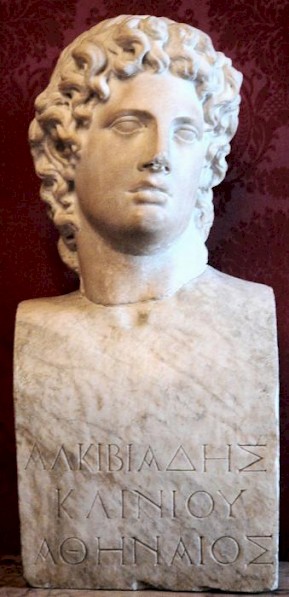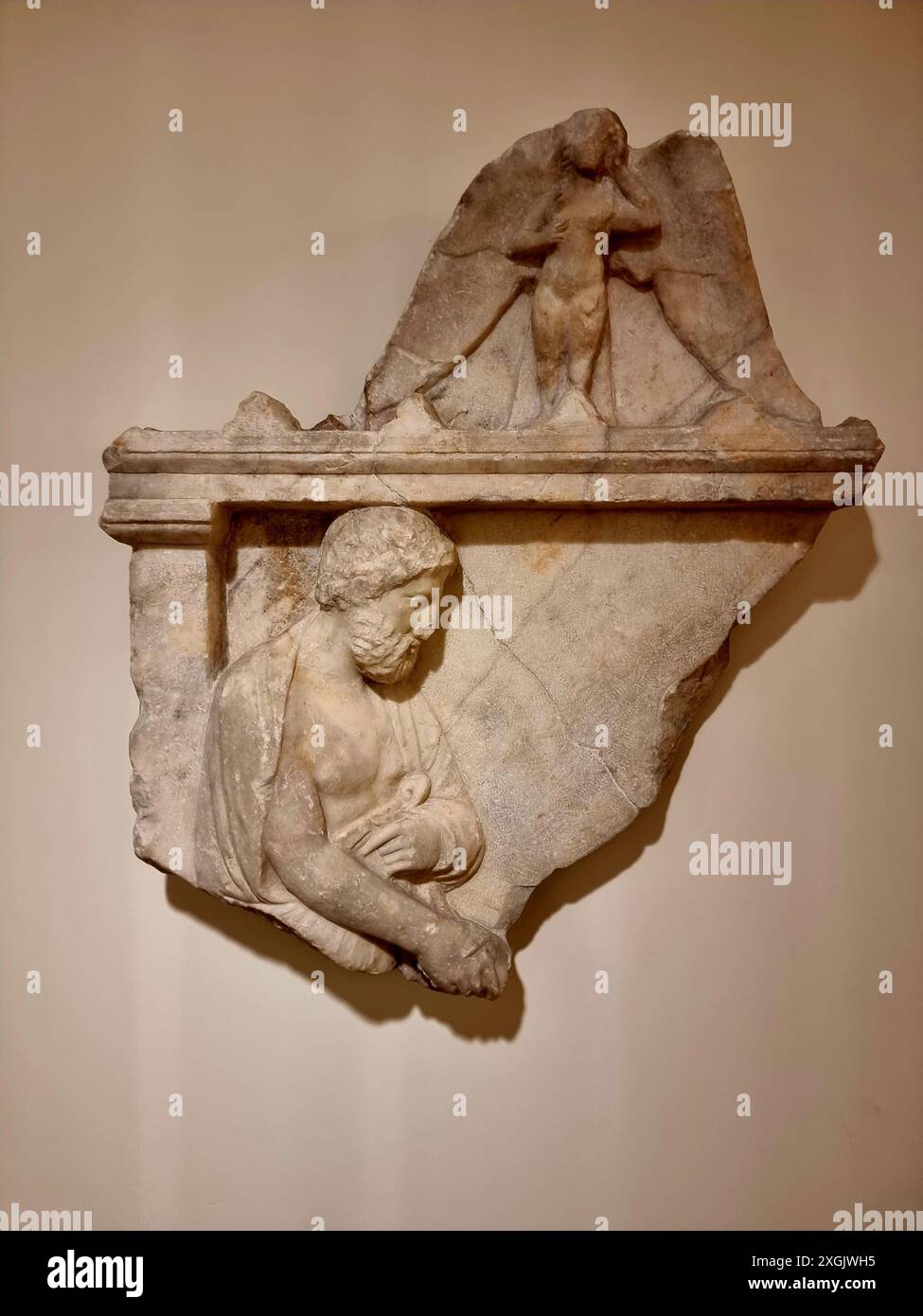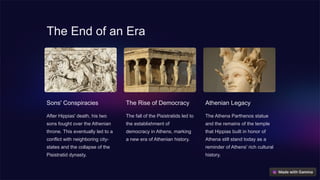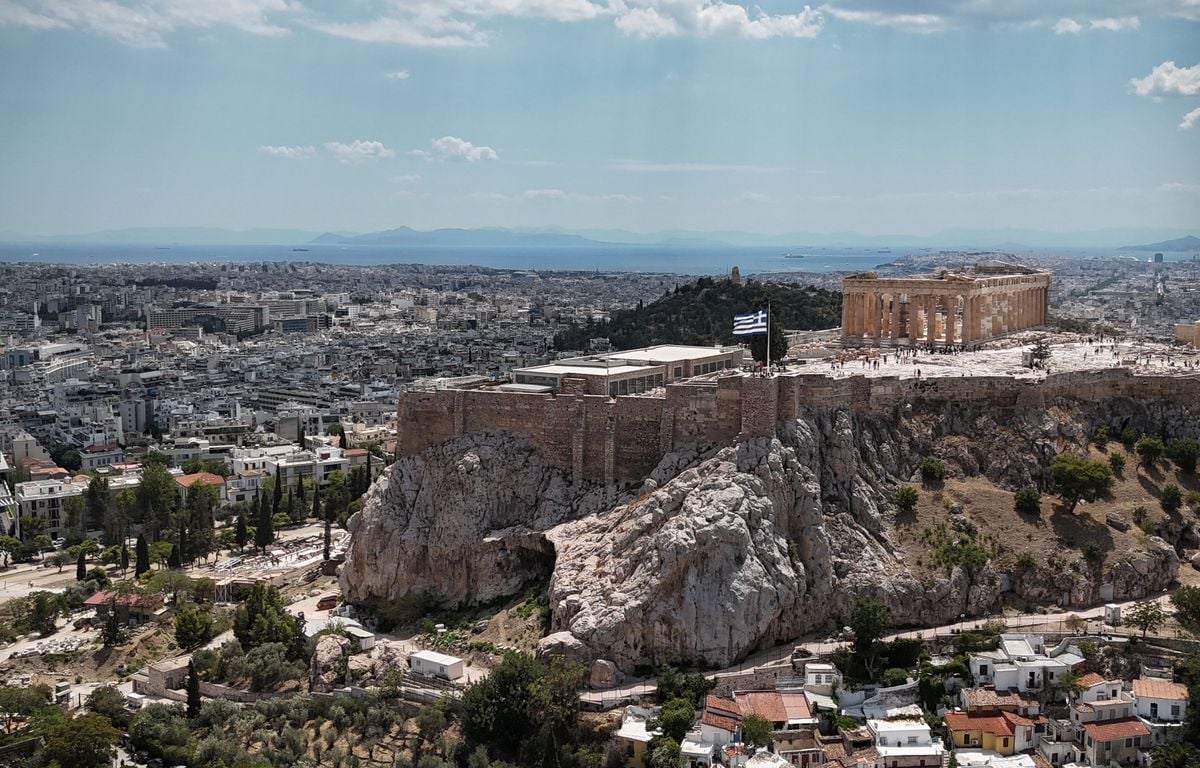Alcibiades: The Enigmatic Strategist of Ancient Athens
Introduction
In the tumultuous landscape of classical Greek politics and warfare, few figures stand out as enigmatic and complex as Alcibiades. Born in 450 BC into the illustrious Alcibiadean family of Athens, he was a man whose influence stretched far beyond his years, leaving a lasting impact on the history of ancient Greece. Known for his charisma, tactical prowess, and unorthodox methods, Alcibiades played a pivotal role in the Peloponnesian War, which saw the clash between Athens and Sparta. Yet, his life and death remain shrouded in mystery, marked by betrayal, assassination, and the enduring allure of one of the most controversial figures of antiquity.
The Rise of Alcibiades
Alcibiades' early life was marked by privilege and potential. Born to Cleinias and Taea, a Thracian woman, Alcibiades was raised in a household that combined aristocratic ambition with a cultural exchange that was unusual even in the cosmopolitan city-state of Athens. Growing up alongside famous contemporaries like Socrates, Alcibiades absorbed not only the political acumen but also the philosophical teachings of Athenian society. His education and early experiences laid the groundwork for his later political and military career.
Initially, Alcibiades aligned himself with the democratic and pro-Spartan factions within Athens. This strategic choice helped him secure influential positions within the Athenian Assembly and the military. However, it would be a series of events and personal rivalries that would shape his reputation and eventual rise to power.
One of the first major events that highlighted Alcibiades' political astuteness came during the Persian Wars. As a young man, he gained recognition when he proposed constructing a fort at Decelea, which effectively undermined Persian influence in Attica. His proposal marked his early success in shaping military and strategic policies, a skillset that would serve him well throughout his career.
The Strategic Genius of Alcibiades
Alcibiades is often remembered for his brilliance as a military commander and strategist. His innovative and versatile approach to warfare earned him both accolades and controversy. One of the most notable instances of his strategic ingenuity was during the Sicilian Expedition of 415–413 BC. Despite initial reluctance from Athenian leaders, Alcibiades argued for the expedition as a means to secure additional resources and bolster Athenian naval superiority.
When the expedition began, Alcibiades was forced to leave before its departure due to a scandal involving impiety, which implicated both him and the popular general Theramenes. Despite this setback, his influence remained significant. Upon reaching Athens, he was recalled and appointed to command a fleet that sailed to relieve the besieged city of Naxos. However, as his ships rounded the Peloponnese, they were intercepted by Spartan forces, leading to the disastrous Battle of Aegospotami in 405 BC. Although not present, his strategic genius and the subsequent loss of the Athenian fleet contributed to the end of the Peloponnesian War, marking the decline of Athenian power in the region.
Pivotal Moments in Alcibiades' Political生涯
Alcibiades’ political trajectory is marked by a series of transformative moments, each contributing to his growing fame and notoriety. After his recall to lead the Sicilian Expedition, Alcibiades faced a critical challenge in 415 BC when he arrived in the Peloponnesian War front lines, only to find himself involved in a scandalous affair that implicated both him and Theramenes. This scandal led to their arrest by democratic forces, prompting Alcibiades and Theramenes to flee under threat of prosecution.
The aftermath of the scandal underscored the volatile nature of Athenian politics. Alcibiades, despite his contributions to the Sicilian Expedition, was seen as a liability rather than a valuable asset. His absence from the field during the Battle of Aegospotami in 405 BC significantly impacted the Athenian defeat—a battle where his fleet's destruction by the Spartans marked a decisive turning point in the war’s favor for Sparta.
However, Alcibiades’ story does not end in defeat. He went on to seek refuge in Thrace, where he established himself as a military and political leader. His presence in Thrace drew mixed reactions among the local populations and neighboring states. For some, he was a symbol of strength and resilience, while for others, his association with Athens made him a target of suspicion. This period in Thrace also saw Alcibiades offering military advice to various cities within Thrace, including Chersonese, which eventually led to its occupation by the Spartan general Lysander.
Strategic Shifts and Loyalties
The narrative of Alcibiades' strategic shifts and changing loyalties is complex and multifaceted. His initial pro-Spartan stance, which stemmed partly from his upbringing and early political inclinations, took a dramatic turn when he defected to Sparta. This decision, though fateful, was driven by a combination of pragmatic and idealistic motivations. Alcibiades was convinced that he could better serve his ambitions and potentially change the course of the war from within.
In Sparta, Alcibiades quickly gained favor and trust. He provided them with valuable intelligence about Athenian military plans and offered strategic suggestions that often proved advantageous. This period, especially the crucial Battle of Aegospotami in 405 BC, was characterized by his cunning and foresight. However, his betrayal and desertion were not solely driven by altruistic goals; they also reflected his ambition to carve out his own place among the great strategists of his time.
Upon his return to Athens following his reconciliation with the city, Alcibiades assumed a leadership role that mirrored his previous strategic prowess. However, the complex interplay of personal vendettas, political alliances, and shifting alliances complicated his position. His efforts to consolidate power and influence among the Athenian elite were met with resistance, leading to internal conflicts and suspicions.
The fluctuating nature of his alliances and strategies reflects the unstable political environment of ancient Greece. Each decision and defection served as a critical turning point in his biography, influencing not only his own fate but also the historical trajectory of the conflict. These strategic shifts underscore the complexity of Alcibiades’ character, highlighting how he navigated treacherous waters to achieve his objectives.
In essence, Alcibiades was a man whose reputation and legacy are intrinsically tied to the very dynamics of the Peloponnesian War. His strategic genius was a double-edged sword, capable of both triumph and tragic downfall. His loyalty oscillated between Athens and Sparta, influenced by a myriad of factors, yet his influence over military outcomes cannot be overstated.
---
Political Manipulations and Personal Vindication
Upon his return to Athens, Alcibiades sought to rectify the political wrongs he had suffered while in exile. His initial plan involved a rapprochement with the Spartans and a negotiated peace, hoping to leverage his experience and insights. However, his strategy was met with skepticism, largely because of the lingering mistrust and resentment among Athenians. This period was fraught with political manipulations and power struggles, as various factions within Athens vied for control.
Alcibiades' efforts to re-establish himself politically were complicated by a series of trials and accusations against him. Despite his contributions in the Sicilian Expedition, which had been decisive in Athens' favor, his involvement in the impiety scandal still cast a shadow over his public image. Nevertheless, he managed to navigate these trials through strategic alliances and persuasive arguments, often leveraging the support of influential figures who recognized his value.
His return to power was marked by a blend of tactical finesse and political maneuvering. Alcibiades capitalized on the discontent of the Athenian populace, particularly after the disappointing peace offered by the Spartans at Nicias. He championed a more aggressive and expansive policy, aiming to restore Athens' dominance in the Mediterranean. Through his charismatic oratory and strategic vision, he successfully secured the necessary support to reassert Athenian influence.
One of his most notable achievements was securing an alliance with Argos, a powerful and strategic city-state. This alliance not only enhanced Athens' political standing but also provided a strong base for his military campaigns. Under his leadership, Athenian forces launched successful offensives, expanding their territories and consolidating their power in regions such as Ionia and the Hellespont. These actions not only boosted Athens' military prestige but also demonstrated Alcibiades' unrivaled strategic capabilities.
Tragic Decline and Final Days
The zenith of Alcibiades' political influence was short-lived, however. His fortunes took a sharp turn with a series of catastrophic events. In 412 BC, a naval engagement at Cyzicus saw his forces defeated, and his reputation was further tarnished by allegations of drunkenness and incompetence. These accusations, while likely exaggerated, deeply affected his standing among the Athenian populace and leadership.
The internal strife within Athens was exacerbated by tensions between Alcibiades and other prominent figures, such as Antiphon and Nicias, who viewed him as a threat to their own political aspirations. These rivalries culminated in a trial that accused Alcibiades of treason and religious impiety once again. The outcome was inevitable; his exile from Athens was confirmed, and he was branded a traitor.
Exiled once more, Alcibiades turned his attention towards Persia, seeking protection and patronage at a critical juncture. Under the auspices of the Persian satrap Tissaphernes, Alcibiades continued to play a significant role in the Greek conflicts. His relationship with the Persians was complex; while he enjoyed a degree of freedom and influence, he also faced challenges such as the intrigues of other Greek leaders and the complexities of Persian politics.
However, the final chapter of Alcibiades' life is marked by tragedy. Historians place his death sometime between 407 and 404 BC, under mysterious circumstances. Some accounts suggest that he may have been poisoned by the Persian king Artaxerxes I, possibly due to rivalries and conspiracies among the Persian nobility. Others propose that he died in exile, perhaps aboard a ship returning to Athens after a failed attempt to gain back favor and reclaim his position. Regardless of the exact details, the circumstances of his death continue to fuel speculation and debate among historians.
Alcibiades' legacy is thus one characterized by profound achievement and equally profound controversy. His strategic brilliance and dynamic personality have captivated historians and enthusiasts alike for centuries. Despite his turbulent life and numerous setbacks, he remains a prominent figure in the annals of ancient Greek history.
---
Legacy and Modern Interpretations
Alcibiades' enduring legacy lies in the paradoxical nature of his character and the significant impact he had on the political and military landscapes of Classical Greece. His influence is evident in the way he shaped Athenian policies and participated in crucial conflicts, yet his tumultuous life story also serves as a cautionary tale of the pitfalls of political hubris and betrayal.
To the Greeks, Alcibiades was simultaneously admired for his talent and feared for his disruptive nature. Socrates himself spoke highly of Alcibiades, recognizing both his gifts and his potential for destruction, famously stating that he might have been a god if he had been less ambitious. This duality is encapsulated in Plato's writings, where Alcibiades appears as a character whose complex and contradictory personality drives many of the dialogues.
Modern historians and scholars continue to grapple with Alcibiades, seeking to understand the man behind the historical accounts. While ancient sources often portray him as mercurial and unpredictable, contemporary interpretations tend to offer a more nuanced view. Researchers examine his relationships with key figures like Socrates, examine the socio-political context of his time, and investigate the psychological factors that may have influenced his actions.
Moreover, Alcibiades has left a lasting imprint on modern popular culture. From plays and novels to films and documentaries, his story continues to fascinate audiences. His name and persona are often invoked in discussions about leadership, strategy, and the complexities of international relations. The enduring fascination with Alcibiades highlights his significance as a figure whose life remains as compelling today as it did in his time.
Finally, Alcibiades' role in the Peloponnesian War serves as a case study in the importance of personal leadership and strategic foresight in shaping historical events. His legacy encourages reflection on the interplay between individual action and broader political contexts, providing valuable insights for contemporary studies of leadership and conflict.
In conclusion, Alcibiades remains a towering figure in the history of Classical Greece. His life, filled with triumphs and tragedies, offers a rich tapestry of human potential and fallibility. As we continue to explore his story, his lessons continue to resonate, reminding us of the enduring power of individual charisma and strategic acumen in shaping the course of history.
Legacy and Modern Interpretations (continued)
Despite the tragic end to his life, Alcibiades' lasting impact is undeniable. In modern times, he has been the subject of numerous scholarly works, artistic representations, and popular discourse. His influence extends far beyond the confines of ancient Greek history, offering valuable insights into leadership, strategy, and the complexities of human nature.
One prominent area where Alcibiades continues to be studied is in the realm of political science and military strategy. His innovative tactics and strategic mind have attracted the attention of academics and practitioners alike. Modern military historians examine his naval strategies, particularly during the Sicilian Expedition, to understand the principles of sea power and amphibious warfare. His approach to resource management and logistics—such as the construction of fortifications and supply lines—offers timeless lessons in operational planning.
Alcibiades' psychological profile also remains a subject of interest. Scholars delve into his personality traits, examining whether his impulsiveness, ambition, and charisma were driving forces behind his actions. Psychological analyses often highlight his complex emotional state and the role of personal ambition in his decisions and behaviors. This interdisciplinary approach helps to paint a more accurate picture of the multifaceted individual he was.
Popular Cultural Impact
Alcibiades has made significant inroads into popular culture, finding expression in a variety of media forms. Novels and biographies have romanticized his life, presenting him as a tragic hero and a flawed genius. Works like Robert Graves' "Count Belisarius" and Nathaniel Hawthorne's "Dr. Faustus" feature characters inspired by Alcibiades, adding layers of complexity to his already storied life story.
Television and film adaptations have also portrayed Alcibiades, often emphasizing his dramatic storyline. Shows like "History" and "Rampart" have included him in their narratives, bringing his character to a wider audience and fostering public interest in his life. These depictions vary in their accuracy but invariably capture the intrigue and drama inherent in his story, making him relatable across different generations.
Reevaluation in Recent Scholarship
In recent years, there has been a shift in scholarly perspectives regarding Alcibiades. Modern historians aim to present a more balanced and nuanced view, moving away from traditional dichotomies that portray him as either purely virtuous or nefariously corrupt. Research now examines a broader range of sources, including fragmented documents and archaeological evidence, to construct a more comprehensive understanding of his life.
Apart from historical scholarship, Alcibiades' story has inspired modern political analysis. Political scientists draw parallels between his tactics and those of contemporary leaders, examining how personal ambition and strategic thinking can influence geopolitics. His life serves as a cautionary tale about the delicate balance between individual initiative and broader political realities.
Alcibiades in Education and Culture
The legacy of Alcibiades extends into educational settings and cultural institutions. Schools and universities often include his life and work in their curricula, particularly in courses on ancient Greek history and philosophy. Educators use his story to engage students in discussions about leadership, ethics, and the complexities of political power. Additionally, cultural institutions like museums and galleries occasionally host exhibits and symposia focused on Alcibiades, providing deeper insights into his historical context and cultural significance.
Furthermore, Alcibiades has influenced the development of various artistic movements. From paintings and sculptures to theatrical performances, his life provides fertile ground for creative expression. Artists often draw inspiration from his dramatic life and the stark contrasts of his personal journey, creating works that resonate with themes of heroism, betrayal, and redemption.
Conclusion
Alcibiades remains a captivating and controversial figure in the annals of ancient and modern history. His life, marked by unparalleled ambition and a unique blend of brilliance and infamy, continues to fascinate scholars and the general public alike. As the world grapples with issues of leadership, diplomacy, and ethical conduct, the legacy of Alcibiades offers invaluable lessons and insights. Whether through scholarly inquiry, artistic expression, or popular imagination, his story will undoubtedly persist, inspiring future generations to explore the complexities of human nature and the forces that shape the course of history.


:max_bytes(150000):strip_icc()/Alcibiades_and_Socrates-9631c3a54fb04416bcc487f30c8f193c.jpg)












Comments